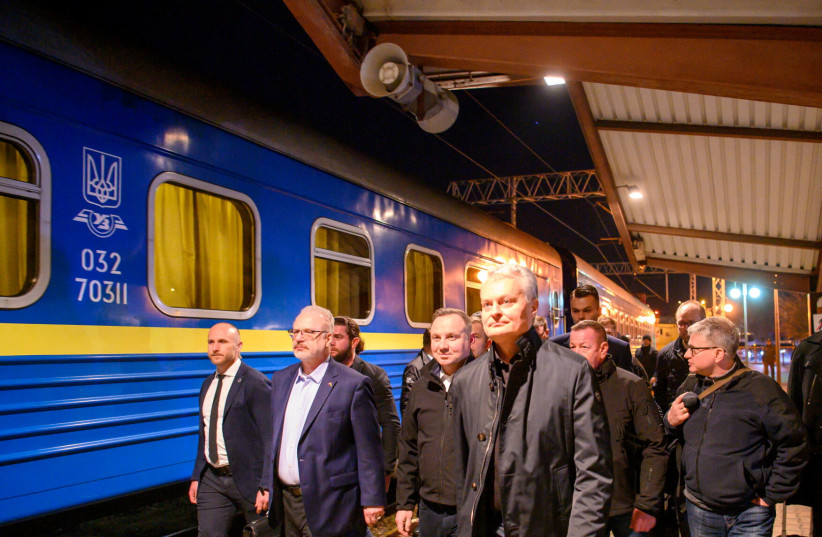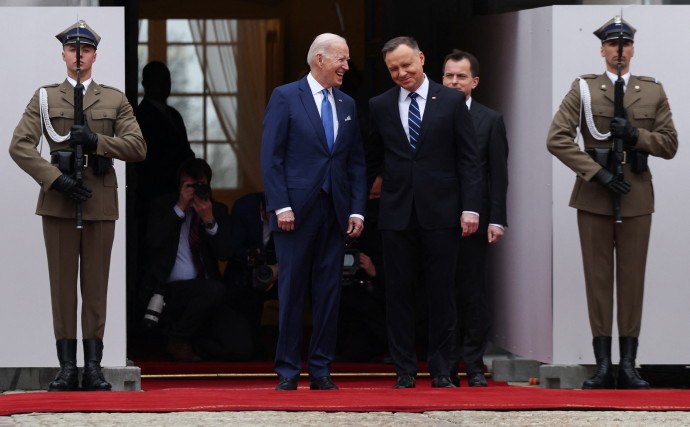An adviser to Ukrainian President Volodymyr Zelensky's chief of staff, Serhiy Leshchenko, denied in an interview with CNN that Zelenskiy had rejected a visit offer from the German President Frank-Walter Steinmeier, as reported by the Bild newspaper.
Steinmeier said on Tuesday that he had planned to visit Kyiv with his Polish counterpart and the presidents of Estonia, Lithuania and Latvia "to send a strong signal of European solidarity with Ukraine ... (but) that was not wanted in Kyiv."
Bild reported that Zelenskiy had rejected Steinmeier's plans to visit due to his close relations with Russia in recent years and his years of support for the Nord Stream 2 gas pipeline, a project designed to double the flow of Russian gas direct to Germany but which has since been canceled.
"The president would have liked to go to Ukraine and would have visited the president," Scholz told RBB public radio.
Asked if he himself planned a visit to Kyiv, Scholz said he was in more regular contact with Zelensky than almost any other Western politician.
Leaders of Poland and Baltic states head to Kyiv
The presidents of Poland, Lithuania, Latvia and Estonia are on their way to Kyiv to meet Ukraine's President Volodymyr Zelensky, an adviser to the Polish leader said on Wednesday.

The four join a growing number of European politicians to visit the Ukrainian capital since Russian forces were driven away from the country's north earlier this month.
"Heading to Kyiv with a strong message of political support and military assistance," Lithuanian President Gitanas Nauseda tweeted on Wednesday, along with a picture of the presidents next to a train.
The "symbolic" visit will include talks about the details of support, Pawel Szrot, head of the Polish president Andrzej Duda's office told private broadcaster Polsat News.
It comes the day after US President Joe Biden said Moscow's invasion of Ukraine amounted to genocide, while President Vladimir Putin promised Russia would "rhythmically and calmly" continue its operation and achieve its goals.
The four presidents' offices declined to provide details of the visit for security reasons.

Putin sent his troops into Ukraine on Feb. 24 on what he calls a "special military operation" to demilitarize and "denazify" Ukraine. Ukraine and the West say Putin launched an unprovoked war of aggression.
German President Frank-Walter Steinmeier planned to visit Kyiv at the same time "to send a strong signal of European solidarity with Ukraine there," but was not welcomed by Ukraine, he said on Tuesday.
German Bild newspaper reported that Zelensky had rejected Steinmeier's plans to visit due to his close relations with Russia in recent years and his support for the Nord Stream 2 gas pipeline designed to double the flow of Russian gas to Germany, which has since been suspended.
Swiss to adopt latest round of EU sanctions on Russia
Switzerland has adopted the latest round of European Union sanctions against Russia and Belarus for Moscow's military aggression against Ukraine, the government said on Wednesday, keeping the neutral country in line with EU measures.
It also approved sanctioning a further 200 individuals and entities, including two of Russian President Vladimir Putin's daughters.
"Switzerland's list of sanctions now fully mirrors that of the EU," it said in a statement.
The amendments will come into force at 1600 GMT.
The EU on Friday formally adopted sweeping new sanctions against Russia, including bans on the import of coal, wood, chemicals and on all transactions with four Russian banks, including VTB VTBR.MM.
Switzerland deviated from the package only by omitting bans on road and sea transport to the EU, which it said were not needed due to Switzerland's geographic location.
The Alpine country said last week it had so far frozen 7.5 billion Swiss francs ($8 billion) in funds and assets under sanctions against Russians.
Switzerland's small neighbor Liechtenstein has also adopted EU sanctions and said last week it had frozen around 260 million Swiss francs linked to Russia.
Unlike other countries, Switzerland has not expelled any Russian diplomats in reaction to civilian deaths in the Ukrainian town of Bucha.
